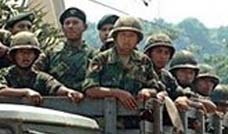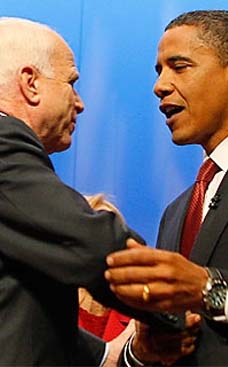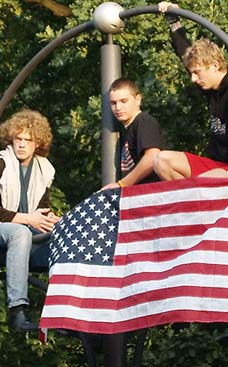
The Peace Corps flew all 113 of its volunteers out of Bolivia on cargo planes, and 78 of them later decided to leave the organization. But several of those -- more than 15, by some of their estimates -- have since returned to the cities and villages of Bolivia to keep working on their own. In the aftermath of the evacuation, a sense of distaste lingers for some. Why, when so many of them felt so safe, were they forced to leave? The Peace Corps instructed Cooper Swanson to leave as soon as possible for Cochabamba, the regional capital and home of Bolivia's Peace Corps headquarters. A commercial he saw on television as he was leaving -- an attack on Goldberg for meeting with an opposition governor -- left him with a feeling that this "consolidation" might be different. "At that moment, I was like, 'We're not going to be here much longer.' Just a direct hit on the United States," he said. When the Peace Corps' Bolivia director, Kathleen Sifer, spoke to the worried group Sunday morning at a hotel, she was already speaking in the past tense, Swanson said: "You were all great volunteers." They would be leaving for Lima, Peru, she said. In an hour. Some volunteers, Nourse recalled, "just started bawling." The Peace Corps' evacuation of all its volunteers in Bolivia last month forced Swanson, 24, to consider these goals and make a choice: stay with the Peace Corps and finish his term in another country, or leave the organization and return to Mizque. He would not have the salary, health insurance, support network or protection that come with the Peace Corps, at a time of sporadic political violence in Bolivia and just after the government had thrown out the U.S. ambassador. "It wasn't even really much of a decision," he said. In an e-mail to friends and family, he wrote soon after the evacuation: "I am no longer a Peace Corps volunteer."
Some Peace Corps Volunteers return to Bolivia on their own to complete the projects they have started
Policy and Passions Collide in Bolivia
Peace Corps Exodus Leads Some Workers To Finish Job Alone
By Joshua Partlow
Washington Post Foreign Service
Thursday, October 23, 2008; Page A01
Caption: Former Peace Corps volunteer Cooper Swanson, 24, teaches his students computer basics at the all-girls Catholic boarding school in Mizque.Swanson decided to return to Bolivia on his own after being evacuated by the Peace Corps due to security concerns because he wanted to finish the work he had started there as a volunteer. Photo: Evan Abramson-The Washington Post
MIZQUE, Bolivia -- For an unemployed man, Cooper Swanson is busy. One minute he is at the hospital, going over a plan to combat Chagas' disease. The next, he is teaching accounting to peasant weavers.
At the Catholic boarding school, he demonstrates PowerPoint software to teenage girls. At the public high school, he screens a movie he directed about protecting archaeological sites. He worked to open a library. He served in the mayor's office. He helped bring the Internet to this village of 4,000 people nearly 8,000 feet up in the Andes.
"I have lots of ambitious goals," Swanson said.
The Peace Corps' evacuation of all its volunteers in Bolivia last month forced Swanson, 24, to consider these goals and make a choice: stay with the Peace Corps and finish his term in another country, or leave the organization and return to Mizque. He would not have the salary, health insurance, support network or protection that come with the Peace Corps, at a time of sporadic political violence in Bolivia and just after the government had thrown out the U.S. ambassador.
"It wasn't even really much of a decision," he said. In an e-mail to friends and family, he wrote soon after the evacuation: "I am no longer a Peace Corps volunteer."
The Peace Corps flew all 113 of its volunteers out of Bolivia on cargo planes, and 78 of them later decided to leave the organization. But several of those -- more than 15, by some of their estimates -- have since returned to the cities and villages of Bolivia to keep working on their own. In the aftermath of the evacuation, a sense of distaste lingers for some. Why, when so many of them felt so safe, were they forced to leave?
"Peace Corps, unfortunately, has become another weapon in the US diplomatic arsenal," volunteer Sarah Nourse of Mechanicsville, Md., wrote in a widely circulated e-mail. The Peace Corps withdrawal "is one more chance for the US to maintain its tough image and hit back, harder.
ad_icon
"More than ever, Bolivia needs living examples of real Americans," Nourse went on. "They need someone to help, not for financial gains but because the task exists and because it's the right thing to do."
President John F. Kennedy established the Peace Corps in 1961 to "promote world peace and friendship . . . under conditions of hardship if necessary." Since then, 190,000 volunteers have served in 139 countries. Today, there are about 7,800 Peace Corps volunteers. Evacuations are relatively rare but not unprecedented. This year, in addition to Bolivia, the Peace Corps suspended programs in Kenya and Georgia for safety and security reasons. The organization is already back in Kenya and hopes to return to Georgia and Bolivia when appropriate, officials said.
Swanson, the son of musicians from Raleigh, N.C., and a graduate of North Carolina State University, had been in Bolivia since August 2006. About 8 p.m. Thursday, Sept. 11, he received a text message on his cellphone. It was the Emergency Action Plan, again. Twenty times over the past 21 months, the Peace Corps had initiated its emergency plans in response to violence or political disturbance. Usually, it involved staying put and calling in to headquarters regularly. But twice, Swanson had been "consolidated" with other volunteers in another city to wait out an intense period. And this week had been particularly intense.
That Tuesday, in the lowland region of Santa Cruz, the heart of the fierce opposition to President Evo Morales, protesters had clashed with police and sacked government offices, including the national telephone company, Entel. The next day, Morales declared U.S. Ambassador Philip Goldberg a persona non grata, only the sixth such declaration in U.S. diplomatic history, and accused him of conspiring with the opposition, a charge Goldberg and the U.S. government denied. On Thursday, two days later, supporters of Morales marching in the far northern region of Pando came under attack, and as many as 18 of them were killed, according to the Bolivian government.
Still, Swanson did not want to leave. His small town, in a central mountain valley, was quiet, as always. The violence seemed isolated and distant from the cobblestone streets of Mizque, set amid the hills of scrub brush and cactus, dotted by thatched roof adobe huts. He had work to do, and the best weekend of the year lay ahead: the town's biggest festival, with bullfights and parades around the tree-shaded central plaza. "I obviously had no plans of going anywhere," he said.
But the Peace Corps instructed him to leave as soon as possible for Cochabamba, the regional capital and home of Bolivia's Peace Corps headquarters. A commercial he saw on television as he was leaving -- an attack on Goldberg for meeting with an opposition governor -- left him with a feeling that this "consolidation" might be different. "At that moment, I was like, 'We're not going to be here much longer.' Just a direct hit on the United States," he said.
When the Peace Corps' Bolivia director, Kathleen Sifer, spoke to the worried group Sunday morning at a hotel, she was already speaking in the past tense, Swanson said: "You were all great volunteers." They would be leaving for Lima, Peru, she said. In an hour. Some volunteers, Nourse recalled, "just started bawling."
The Peace Corps, which started in Bolivia in 1962, has run into controversy in that country in the past. The Bolivian government expelled the Peace Corps in 1971 after a fictional movie depicting volunteers sterilizing Bolivian women aroused widespread anti-American sentiment. The organization did not return to the country until 1990, and the volunteers are still shown "Blood of the Condor" during their training and stay away from family planning programs, Swanson said.
In February, an American Fulbright scholar said a U.S. Embassy security official had asked him for the names and addresses of any Venezuelans or Cubans living in Bolivia. The official also allegedly asked Peace Corps volunteers for similar information. The State Department called the requests inappropriate and denied using the programs to gather intelligence. But Morales publicly condemned the security officer, and Bolivian officials have widely repeated the accusation that the Peace Corps is involved in intelligence gathering.
This time, the volunteers' departure, and subsequent suspension of the program, was strictly based on safety concerns and was not retaliation for the ambassador's expulsion, according to Peace Corps officials. The volunteers left "due to increasing civil unrest, including blockading of major transportation routes, and escalating violence against Bolivian citizens," said Peace Corps spokeswoman Josie Duckett. The program does not anticipate being able to send volunteers to Bolivia until next fall at the earliest, Duckett said.
The American and Bolivian governments seem to agree that the evacuation was necessary.
"The less presence of the United States in Bolivia, the better," Juan Ramón Quintana, Bolivia's minister of the presidency, said in an interview. "We believe the security policies of the United States have damaged the constitutional rights of the students of the Peace Corps, by tasking some of them to do intelligence work."
After the volunteers flew from Bolivia to Peru, they gathered at a resort outside Lima to mull over their futures. Some were upset that all but five of the 42 staff members based in Bolivia would lose their jobs.
At one meeting, the volunteers were asked how many planned to return to Bolivia. About half the group members raised their hands, according to participants. A Peace Corps security official "strongly discouraged" the volunteers from returning, said Aaron York, 26, a volunteer from Washington state.
York, who coached basketball and worked with children in a small community in the Tarija region, decided to return on his own.
"I've never felt safer in my life than I was here," he said. "I needed to be back here. . . . There was no time to say goodbye to everyone, to achieve any kind of closure, in my service, in my life here, and I really felt like I needed that."
Alana Liskov, 24, decided against returning home to Silver Spring, partly because her work remained at a critical juncture.
She had ordered four computers and a printer so her town of La Merced, population 266, could have a computer lab, and she needed to pay for them.
She also figured: "Why would I stay in Peru for a week and then go to Africa or something when I have everything to work on back here?"
Liskov has set up the lab and settled back into the slow rhythms of the village. Members of the town offered to pay her to teach computer classes, but she turned them down because it felt wrong to take their money, she said.
"It's a real stressful situation when you get yanked out like that," she said. "It feels like a relief to get back."
Swanson spent 36 hours on buses to get from Lima back to Cochabamba. Not long after his return to Mizque, he went on a local radio station and explained why the Peace Corps had left.
"I think it was a good move we were taken out of the country," he said later. "I obviously consider it safe enough for myself to be here. . . . In the end, the country goes through these mini- . . .," he paused.
"It has mood swings, right, it goes through these times when it's really not that safe to be here," he said.
But he had missed Bolivia. He wanted to finish up his many projects, say goodbye to his friends and see his girlfriend again.
Swanson said he does not feel any anger about the situation, nor does he feel he is confronting his government by returning. "I prefer to believe we aren't being used as a ploy," he said.
After his seniors graduate from the Catholic boarding school, all 16 of whom are his goddaughters, Swanson plans to return to the United States.
He has not lost his ambition. He wants to go to business school, focus on China, learn to speak Mandarin, then maybe Arabic.
ad_icon
For now, he can be found walking the cobblestone streets of Mizque, the lone American in khaki pants and running shoes, unemployed, smiling, now truly a volunteer.
"I pretty much decided to not let this evacuation influence my goals," he said.













